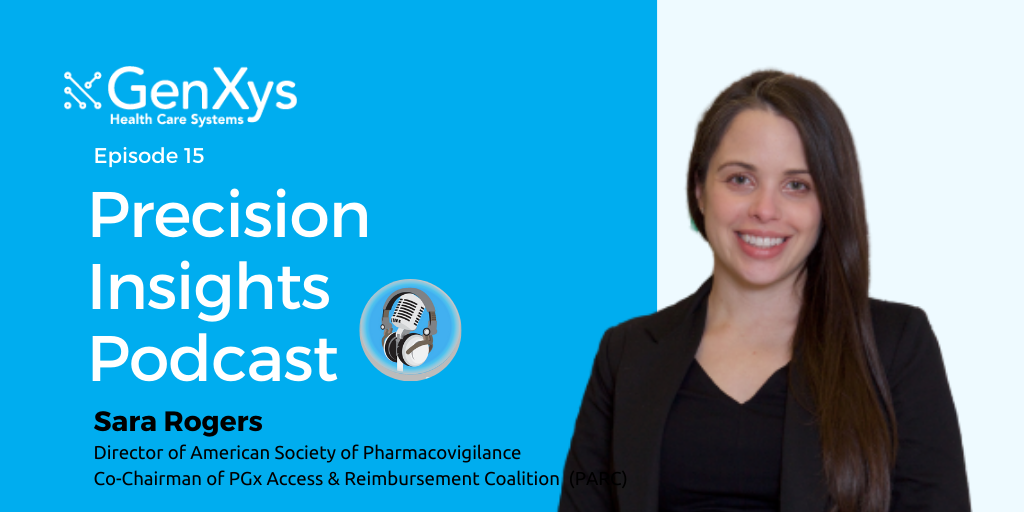
Sara Rogers leads clinical programs at the American Society of Pharmacovigilance (ASP), an organization that builds bridges between groups, ideas, and images to rapidly and dramatically reduce the high rate adverse drug events (ADEs) in the United States.
She co-chairs the Pharmacogenomics Access and Reimbursement Coalition (PARC) to address pain issues and the barriers posed for widespread implementation of pharmacogenetic testing, a proven tool for proactively addressing medication side effects.
Sara also co-developed the Standardizing Laboratory Practices in Pharmacogenomics (STRIPE) initiative, a public and private multidisciplinary collaborative community to accelerate the development of personalized medicine practices as a standard of care.
Communities addressing ADEs, reimbursement for PGx testing and more
An adverse drug reaction (ADR) is a side effect from a medication, something uncomfortable or dangerous that happened when you took a medication that was unexpected. ADRs are part of the even bigger problem of adverse drug events (ADE), which also include medication errors, allergic reactions and overdoses. Adverse drug events in the US are a leading cause of death, right behind cancer and cardiovascular disease.These deaths are almost always preventable.
There was an unmet need for an organization focused on preventing adverse drug events. In 2018, the American Society of Pharmacovigilance (ASP) was founded to create a network of healthcare professionals who are committed to improving the quality of patient care and finding new ways to do it. Many of ASP’s organizational objectives are focused on leveraging pharmacogenetics and personalized medicine to prevent adverse drug reactions by better understanding how a patient is going to respond to a medication.
PARC was founded to address reimbursement issues in the pharmacogenomics field, while STRIPE grew out of a recommendation from one of the internal committees at ASP. The recommendation was based on the still-unresolved issue about the FDA safety communications that had been sent out to clinical laboratories that offer pharmacogenetics services.
The biggest challenge for STRIPE was really to understand the perspective of each of the different beneficiaries of PGx, navigate their existing notions and conceptions, and secure buy-in on the big-picture vision. Including the participation of the FDA. There are 90 members across 15 different healthcare sectors in the community, each of whom have agreed to secure buy-in on the direction of STRIPE and serve as liaisons between STRIPE and their organization to ensure that STRIPE is meeting their needs.
There’s no cost to join ASP or STRIPE, and there are lots of different pathways to participate in either group. Healthcare professionals are welcome to join ASP, and every stakeholder in personalized medicine can register with STRIPE to get correspondence on these ongoing opportunities to participate in ways which align with their skills, interests, and availability. GenXys is a proud member of the STRIPE community and supports the important efforts they are making to solidify PGx adoption and implementation.
Reimbursement and access to pharmacogenomic testing

There are several well-documented barriers to implementing PGx. The most commonly cited across stakeholders are access and reimbursement. Clinical laboratories, health systems, providers, and especially patients are often paying out of pocket for testing. Studies show that more than half of patients wouldn’t pay more than a hundred dollars for a test, and a significant number of respondents could not afford to pay if there was any cost at all.
We need to find ways to pay for PGx so that we can continue to support advancements in the field.
Traditionally, Medicare has covered single gene-drug pair testing, but even that is sporadic and varies by region. The ideal would be to offer preventive PGx panels for patients and have that information available anytime a new medication might be started. There have been some recent updates to local coverage determinations for Medicare, which now covers panel tests for patients who meet certain criteria.
One reason why there’s a shortage of insurance coverage for PGx testing is a lack of payer knowledge about pharmacogenetics testing. Medicare administrative contractors met last year to discuss PGx in the area of psychiatry and assembled a panel of experts to describe the role of PGx and drug response. Just over a year later, Medicare coverage had been updated for PGx in patients with certain psychiatric disorders.
There are some things that aren’t consistently being done that could help move the needle: discrepancies still exist in linking testing with the associated billing code and that’s affecting documentation, record keeping, and the ability to track patient outcomes. It’s hurting the ability to showcase the return-on-investments (ROI) data that payers really want to see. Emphasizing economic utility to payers and plan sponsors is important because they are the ones getting stuck with a bill when an employee has an adverse drug reaction that could have been avoided.
There are unmet education needs across the board. Patient education needs to focus on the strengths and limitations of testing, the potential for false negatives, and a general understanding of the effect that genetics play in drug response. Provider education should be better integrated into medical and pharmacy school curriculums, and there needs to be a focus on PGx as part of continuing education.
(Related Post: UnitedHealth Group Covers PGx Testing: What Employers Need to Know)
Pharmacists: The key piece to the PGx puzzle

PGx represents a paradigm shift. It’s asking physicians to change the way they look at patients. We had insulin before we had laboratory tests to guide insulin dosing. This is the level of specificity that we’re lacking when we decide not to use the available tools to understand each patient’s genetic predisposition and how they may respond to a medication.
Pharmacokinetics was once a cutting edge field and the resistance to incorporating it into clinical practice seemed insurmountable. Now, kinetics is an integral part of the medical and pharmacy school curriculums.
The use of PGx is at a precipice, and it’s going to take a concerted effort to push it forward. Pharmacists are in the best position to lead PGx implementation efforts, to counsel patients on PGx, and should be at the center of care models which seek to use genetics as a tool to optimize medication therapy.
The vast majority of pharmacists who graduated recently are working in a retail setting and spending a good deal of time making sure that the correct drug is in the bottle for the right patient; this is not an unimportant task, but it is one that is binary and one which is becoming automated.
If you are a pharmacist, then PGx is for you- and for your patients. There are many PGx certifications that can help bridge any gaps from what’s included in the pharmacy curriculum to the up-to-date information. The ASP recently detailed what those different certifications are, but pharmacists can also start by typing in pharmacogenomics into a PubMed search and read everything they can about PGx. They can also register to participate in the STRIPE initiative, like GenXys has.
Conclusion
While there are barriers to implementing PGx, it is a worthwhile practice that can prevent adverse drug events, increase patient safety and reduce healthcare costs. Reimbursement is chief among these barriers. Luckily, there are groups like PARC that are working to evaluate and address the needs of the pharmacogenomics community. Reimbursement and access are not the only considerations; PGx efforts also need to be led by the right people with the right knowledge. Pharmacists in particular can work to bring PGx into their profession to move their role from dispensing to using their knowledge for PGx implementation.
Thank you, Sara, for the enlightening discussion about the efforts being made to bring PGx to those who need it!
About Precision Insights Podcast

The Precision Insights podcast is a podcast series consisting of inspiring conversations around precision medicine with industry thought leaders and innovators. Every two months (and sometimes more), we share the most cutting-edge technologies, processes, and initiatives in precision medicine. If you’re a patient, healthcare provider, healthcare executive, employer, or someone simply interested in precision healthcare, you’re sure to find something useful in each episode. We hope that you’ll join our listeners and start taking control of your health, or implement precision health into your workplace/health system as a result!
The Precision Insights Podcast is proudly made by the GenXys team. Feel free to get in touch with us, we would love to hear your feedback, ideas, or thoughts.